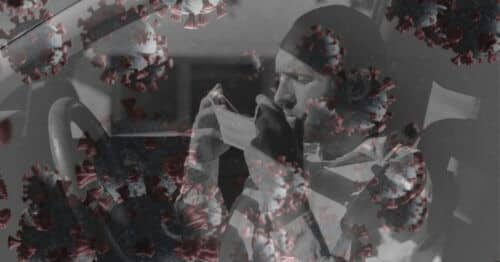A new study conducted on more than 5,000 COVID-19 patients in the city of Houston, Texas, showed that the corona virus accumulates genetic mutations. One of those mutations made it more contagious, and the other helped it evade certain antibodies that were supposed to stop it in the body

A new study conducted on more than 5,000 COVID-19 patients in the city of Houston, Texas, showed that the corona virus accumulates genetic mutations. One of those mutations made it more contagious, and the other helped it evade certain antibodies that were supposed to stop it in the body.
Before we talk about the full meanings of these two mutations, we would like to emphasize that the scientists identified 285 mutations among the viruses they tested (about 49 of which are new and previously unknown). The vast majority of the mutations had no significant effects on the infectivity of the virus or on the severity of the disease it causes... probably. It is, after all, a new virus, as I have already mentioned several times in previous posts, and it is difficult to know exactly how a particular mutation affects its properties. But the important thing is that the virus undergoes mutations, and every time it infects a new person - we roll the dice again and hope that a more dangerous mutation does not develop in that person. And as the main researcher wrote -
"We gave this virus many chances. There's a huge population size out there right now.”[1]
If you wanted a good reason not to try to develop herd immunity among the population, here's another one to add to the list. Well, it's not really new, but it's worth mentioning again.
And now for the two mutations.
The first does not surprise anyone. It is called D614G, and changes the structure of the 'hook' - a protein found on the surface of the virus, thanks to which it can attach to cells. We know that the mutation makes the virus more contagious, because in the first wave in Houston, the mutation could only be found in 71% of the corona viruses that infected the patients. In the second wave in Houston, the prevalence of the mutation jumped to 99.9%. But like I said, no big surprise here, since the same thing is happening all over the world. In fact, in a study published in July in which the researchers went through 28,000 genetic sequences, they discovered that the same mutation became the most common in all the new corona viruses [2].
The second mutation is much more disturbing. She also changed the structure of the virus's hook, and in this way made it difficult for antibodies to recognize it and attach to it. Simply put, it tricked the immune system that developed antibodies against the virus - and at least some of them became less effective as a result of the mutation. And as the researchers wrote in the article -
"These findings suggest that the mutations... may lead to escape from antibodies and other therapeutic agents currently being developed." [3]
I guess I don't need to explain why this mutation is so dangerous. The good news is that it is still relatively rare, and has not spread through the population like the first mutation. And yet, she emphasizes the fact that the virus can undergo mutations to deal with the immune system, with artificial vaccines and with existing drugs against it. It still doesn't do it well, but the more people are infected, the more the chances of more harmful mutations increase.
In the end, the researchers' conclusions were quite simple: we need to monitor more closely the mutations that the virus accumulates, because it mutates at a higher rate than we thought. If they are right, there is good cause for concern here, because such mutations could make it difficult for us to develop effective vaccines – or even natural immunity – against the virus.
Let's hope this is not the case, and in the meantime - we will do as much as possible to reduce the number of people infected, and accordingly also the number of times we roll the dice.
[1] https://www.washingtonpost.com/health/2020/09/23/houston-coronavirus-mutations/
[2] https://www.cell.com/cell/fulltext/S0092-8674(20)30820-5
[3] https://www.medrxiv.org/content/10.1101/2020.09.22.20199125v3.full.pdf
